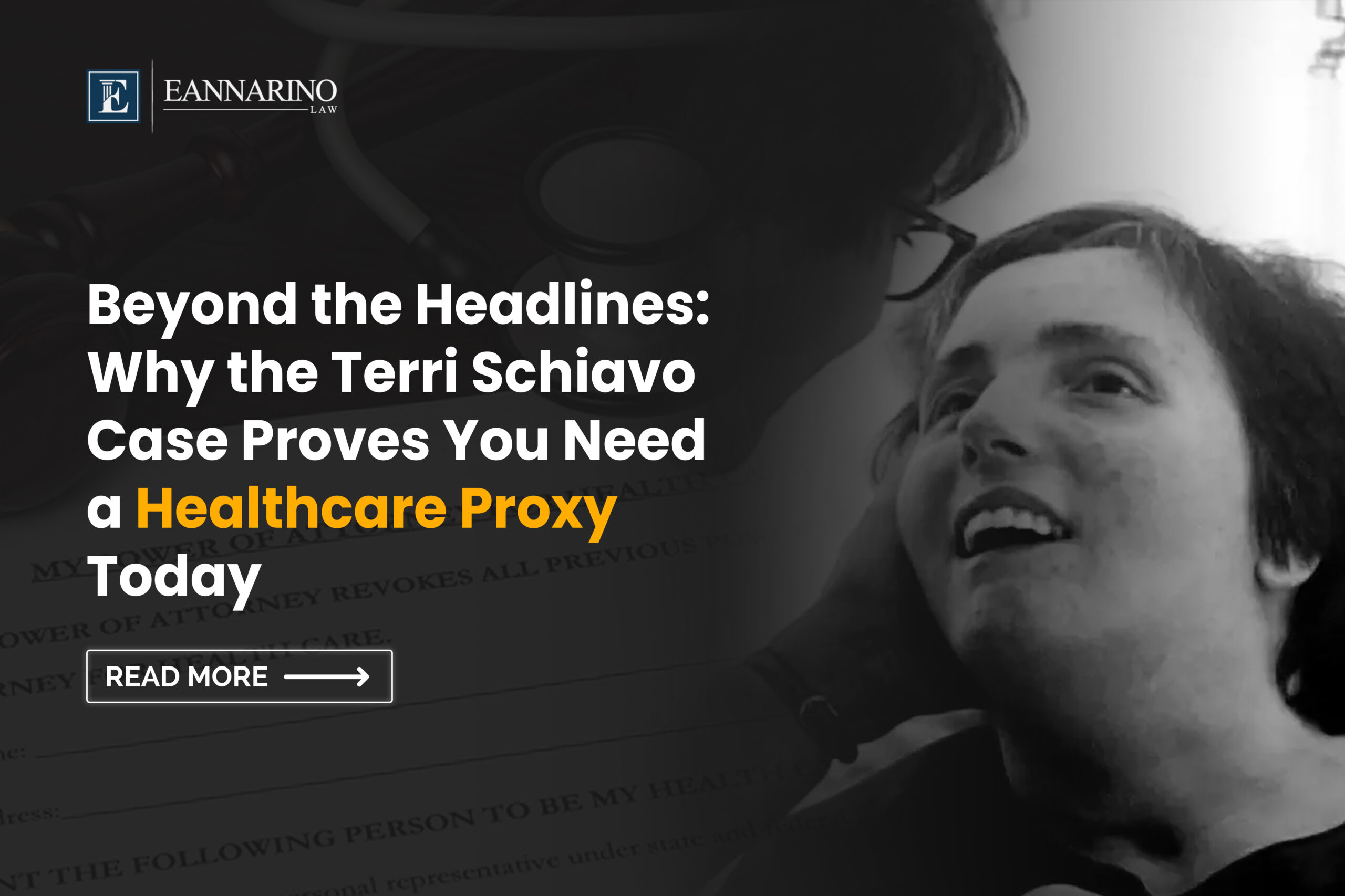
Introduction
In 2005, the nation was captivated by the Terri Schiavo case, a heart-wrenching legal battle that highlighted the profound consequences of not having clear healthcare directives in place. This case didn’t just make headlines—it underscored a critical gap in many Americans’ estate planning: the absence of a healthcare proxy.
In this article, we’ll explore why having a healthcare proxy is not just important, but essential. Using the Terri Schiavo case as a backdrop, we’ll dive into the reasons why a healthcare proxy should be a cornerstone of your estate plan. We’ll cover what a healthcare proxy is, why it matters, how to choose one, and the legal considerations involved. By the end of this article, you’ll understand why taking action today could protect you and your loved ones from the uncertainties of tomorrow.
What is a Healthcare Proxy?
A healthcare proxy is a legal document that allows you to designate someone you trust to make medical decisions on your behalf if you become incapacitated or unable to communicate your wishes. This person, known as your agent or proxy, is empowered to make decisions that align with your values, beliefs, and healthcare preferences.
Unlike a living will, which outlines specific medical treatments you do or do not want, a healthcare proxy grants a trusted individual the authority to make broader medical decisions in real-time, based on the circumstances at hand. This flexibility makes a healthcare proxy an indispensable part of any comprehensive estate plan.
The Terri Schiavo Case: A Cautionary Tale
The Terri Schiavo case is one of the most famous legal battles over end-of-life care in U.S. history. In 1990, 26-year-old Terri Schiavo collapsed due to a heart attack, which led to severe brain damage and left her in a persistent vegetative state. For years, her husband, Michael Schiavo, and her parents, Robert and Mary Schindler, fought in court over whether to keep Terri on life support.
Michael argued that Terri had once expressed a wish not to be kept alive artificially, though this was never documented. Her parents, on the other hand, believed that she had a chance of recovery and wanted to keep her alive. The case became a protracted legal and political battle, involving multiple court decisions, state and federal interventions, and even a law passed by Congress. After seven years of litigation, Terri Schiavo’s feeding tube was removed, and she passed away in March 2005.
This case illustrates the profound consequences of not having a clear healthcare directive in place. If Terri Schiavo had designated a healthcare proxy, it’s possible that her family could have avoided years of legal battles and emotional distress. Her story serves as a powerful reminder of why everyone, regardless of age or health status, needs a healthcare proxy.
Why a Healthcare Proxy is Essential
Ensuring Your Medical Wishes are Respected
One of the primary reasons to have a healthcare proxy is to ensure that your medical wishes are followed, even when you cannot speak for yourself. A healthcare proxy can act as your voice, guiding doctors and loved ones in making decisions that align with your values and beliefs.
In the absence of a healthcare proxy, your loved ones may struggle to interpret your wishes or, worse, may disagree on what you would have wanted. This can lead to prolonged legal battles, as seen in the Schiavo case, where conflicting interpretations of Terri’s wishes resulted in years of court hearings and public debate.
Preventing Family Conflicts
Family disputes over healthcare decisions are not uncommon, especially in emotionally charged situations where a loved one is incapacitated. When there is no designated proxy, these disagreements can escalate into legal battles that divide families and prolong the decision-making process.
By appointing a healthcare proxy, you can reduce the likelihood of such conflicts. The proxy’s legal authority to make decisions can prevent disagreements among family members, ensuring that your healthcare decisions are made smoothly and in accordance with your wishes.
Providing Legal Clarity to Healthcare Providers
Healthcare providers are often faced with difficult decisions when a patient is incapacitated. Without a clear directive from the patient, doctors may be unsure of how to proceed, especially if family members are in disagreement.
A healthcare proxy provides legal clarity, giving doctors the authority to follow the decisions made by your designated agent. This not only ensures that your wishes are respected but also helps healthcare providers avoid potential legal liabilities.
Tailoring Medical Decisions to Your Values
Life is unpredictable, and it’s impossible to foresee every possible medical scenario. While a living will can specify your preferences for certain treatments, a healthcare proxy allows for flexibility in decision-making, tailored to your specific situation.
Your healthcare proxy can make decisions based on your overall values and the guidance you’ve provided, ensuring that the care you receive aligns with your beliefs, even in unforeseen circumstances.
How to Choose Your Healthcare Proxy
Trustworthiness and Understanding of Your Wishes
Choosing the right healthcare proxy is a critical decision. The person you select should be someone you trust implicitly to act in your best interest. They should also have a deep understanding of your values and healthcare preferences.
It’s important to have open and honest conversations with your potential proxy about your wishes, including your views on life-sustaining treatment, pain management, and end-of-life care. The more your proxy understands your values, the better equipped they will be to make decisions that reflect your wishes.
Willingness and Availability
Being a healthcare proxy is a significant responsibility, and not everyone is willing or able to take on the role. Before designating someone as your proxy, make sure they are willing to accept the responsibility and are available to act on your behalf when needed.
It’s also important to consider the proxy’s proximity to you. While it’s possible to make decisions remotely, having a proxy who can be physically present in the event of a medical emergency can be beneficial.
Effective Communication Skills
Your healthcare proxy will need to communicate effectively with healthcare providers, other family members, and possibly even legal representatives. They should be able to advocate for your wishes clearly and assertively, especially in situations where emotions are running high.
Legal Considerations for a Healthcare Proxy
Compliance with State Laws
The legal requirements for healthcare proxies vary by state, so it’s important to ensure that your document complies with the laws of your state. This may involve specific language, witnesses, or notarization.
Consulting with an estate planning attorney can help ensure that your healthcare proxy is legally valid and enforceable in your state.
The Importance of Regular Updates
Life circumstances change, and so might your healthcare wishes or your relationship with your designated proxy. It’s important to review and update your healthcare proxy regularly, especially if there are changes in your health, family dynamics, or personal beliefs.
Updating your healthcare proxy ensures that your current wishes are accurately reflected and that the designated person is still the best choice to represent you.
The Role of a Healthcare Proxy in Estate Planning
A healthcare proxy is an essential component of your overall estate plan. It complements other advance directives, such as a living will or durable power of attorney, by providing flexibility in decision-making and ensuring that your healthcare wishes are followed in real-time.
Working with an estate planning attorney can help you integrate your healthcare proxy with other documents, creating a comprehensive plan that covers all aspects of your healthcare and financial decisions.
Peace of Mind for You and Your Loved Ones
One of the greatest benefits of having a healthcare proxy is the peace of mind it provides. Knowing that your healthcare decisions will be made according to your wishes, even when you can’t communicate them yourself, can relieve a significant burden for both you and your loved ones.
For your family, having a clear directive can alleviate the stress and emotional strain of making difficult decisions in uncertain situations. It ensures that they won’t have to guess your wishes or face potential conflicts with other family members.
Conclusion: Taking Action Today to Protect Tomorrow
The Terri Schiavo case is a poignant reminder of the importance of having a healthcare proxy. Without one, you risk leaving your loved ones to navigate complex and emotional decisions without clear guidance, potentially leading to legal battles and prolonged suffering.
By designating a healthcare proxy today, you can ensure that your healthcare decisions are made according to your wishes, protecting your autonomy and providing peace of mind for your loved ones. Don’t wait until it’s too late—take action now to secure your future and safeguard your healthcare choices.



